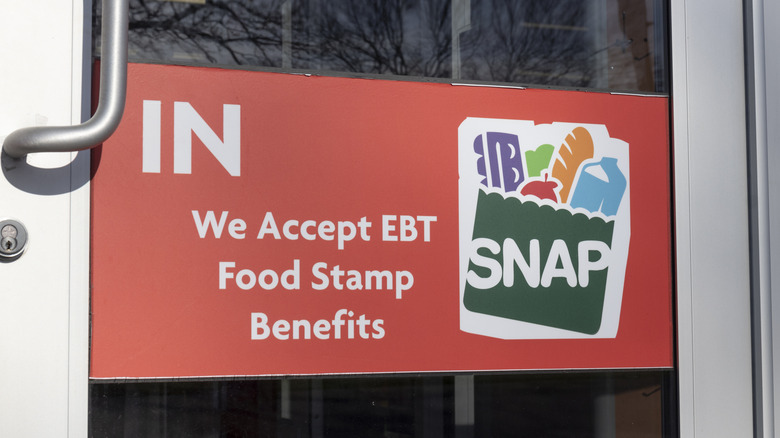The USDA Has An Important Message To Grocery Stores About SNAP Discounts
The United States Department of Agriculture (USDA) has taken a strange, stark stance against the millions of Americans losing out on Supplemental Nutrition Assistance Program (SNAP) benefits by denying any and all discounts for beneficiaries. Grocery stores, which may have been interested in offering SNAP beneficiaries a discount due to the fact that SNAP-EBT dollars are currently being cut off due to the government shutdown, are now unable to do so. While grocery stores slashing prices for those who might go hungry sounds like a noble (and still profitable) move in trying times, the USDA disagrees.
In a message emailed in early November 2025, and posted on the USDA website, thousands of grocery retailers were given a reminder that SNAP-EBT retailers must comply with SNAP equal treatment rules. The reminder email also listed three specific notices, originally written in all-caps. The first: "You must offer eligible foods at the same prices and on the same terms and conditions to SNAP-EBT customers as other customers, except that sales tax cannot be charged on SNAP purchases." Next: "You cannot treat SNAP-EBT customers differently than any other customer." And, finally: "Offering discounts or services only to SNAP paying customers is a SNAP violation unless you have a SNAP equal treatment waiver." SNAP beneficiaries are already facing significant cuts to their food budgets, and the enforcement of this latest email could further hamstring grocery retailers desperate for the $9 billion dollars of November SNAP spending that has remained up in the air.
The current state of SNAP
On November 3, following a court order, President Donald Trump announced that his administration would allow the partial funding of SNAP benefits via an emergency fund. However, on November 4, he then recanted and instead said, via his Truth Social account, that he would not be funding SNAP until the government shutdown ended. More than 40 million Americans count on SNAP. Per the USDA, the average household SNAP benefit, pre-shutdown, was $332 per month, or roughly $177 per person. For context, the average American spends $500 per month on their grocery bill.
However, it's not just individuals who count on SNAP. Grocery stores count on the SNAP dollars spent in their stores, meaning that offering discounts in order to help struggling shoppers would have served as both a goodhearted gesture as well as a desperate move to remain financially solvent. Given the latest USDA guidance, grocery providers will instead have to apply for a waiver through the USDA, which could delay their ability to offer necessary discounts. As it stands, Instacart is offering a 50% grocery discount to SNAP users after receiving its approved USDA waiver, while DoorDash has partnered with select grocery chains to eliminate delivery and service fees for SNAP recipients. Unfortunately, support from neighbors and food banks may be more of a lifeline for SNAP beneficiaries than anything else during this turbulent time.
What is next for the government shutdown
Not showing SNAP recipients better treatment is an unfortunate flipside to the usual rule of not discriminating against SNAP recipients. A spokesperson for the National Grocers Association (NGA) commented to The Hill, "Independent grocers understand the importance of SNAP in helping families access nutritious food and are following all federal guidance to ensure every customer is treated equally. Our members continue to uphold the highest standards of customer service while keeping their communities fed during this challenging time."
The time also seems primed for political showmanship and legal action. The USDA website also includes language that outright blames Democrats for the halt in SNAP funding — something that has already drawn a Hatch Act complaint. 25 states have sued Trump over the SNAP delay so far, with some rulings already in the plaintiff's favor. Trump's approval rating is at a new low of 37%, and the government shutdown is creeping quickly into being the longest on record. Despite Democrats and Republicans being split on spending due to healthcare benefits for qualified U.S. citizens insured through the Affordable Care Act marketplace, some house members are finally broaching bipartisan attempts to extend subsidies in order to finally end the government shutdown. Grocery stores may still feel at odds, but SNAP beneficiaries will continue to feel the strongest pressure until the government reaches a resolution.


